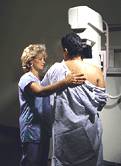
WEDNESDAY, Sept. 3, 2014 (HealthDay News) — Reminder letters signed by family doctors improve the chances that women who are overdue for mammography will return for the breast cancer screening, a new study finds.
Researchers looked at nearly 5,400 women, ages 52 to 74, in British Columbia, Canada, who had normal results on a prior screening mammography and were overdue for another screening by 30 to 48 months.
The women were sent either standard postcard reminders or postcard reminders along with a letter signed by their family doctor. Within six months, 33 percent of women who received the postcard/signed letter had returned for screening, compared to 22 percent of women who received the postcard only.
The study also found that women who had more than one prior screening mammography were 2.2 times more likely to return for screening than those who had just one previous screening.
Women who were less overdue for screening (30 to 36 months) were 2.4 times more likely to return for screening than those who were more overdue (42 to 48 months), according to the study. The findings are scheduled for presentation Thursday at the American Society of Clinical Oncology’s breast cancer symposium in San Francisco.
“For screening mammography to be effective, women have to come for their screening appointments at the recommended intervals,” lead author Dr. Elisa Chan said in a society news release.
“This study shows that for women who are overdue, even though we’ve sent them reminder postcards, a very simple intervention from their family physician can make a big difference in improving the overall screening mammography return rate,” said Chan, who conducted the study while at the B.C. Cancer Agency in western Canada. She is now a radiation oncologist at Saint John Regional Hospital in New Brunswick and an assistant professor at Dalhousie University in Halifax.
Doctor-signed reminder letters may be effective because women typically have a trusting and long-term relationship with their family doctor, said Chan, who noted this approach takes less time and resources than other methods such as telephone reminders.
Efforts to boost breast cancer screening detection rates often focus on advances in imaging technology, noted Dr. Julie White, one of the symposium planners. “In contrast, this study highlights how detection by screening may be improved by simply using a reminder to women with a more personal touch,” she said in the news release.
Research presented at meetings is considered preliminary until published in a peer-reviewed journal.
More information
The U.S. National Cancer Institute has more about breast cancer screening.
Copyright © 2026 HealthDay. All rights reserved.

